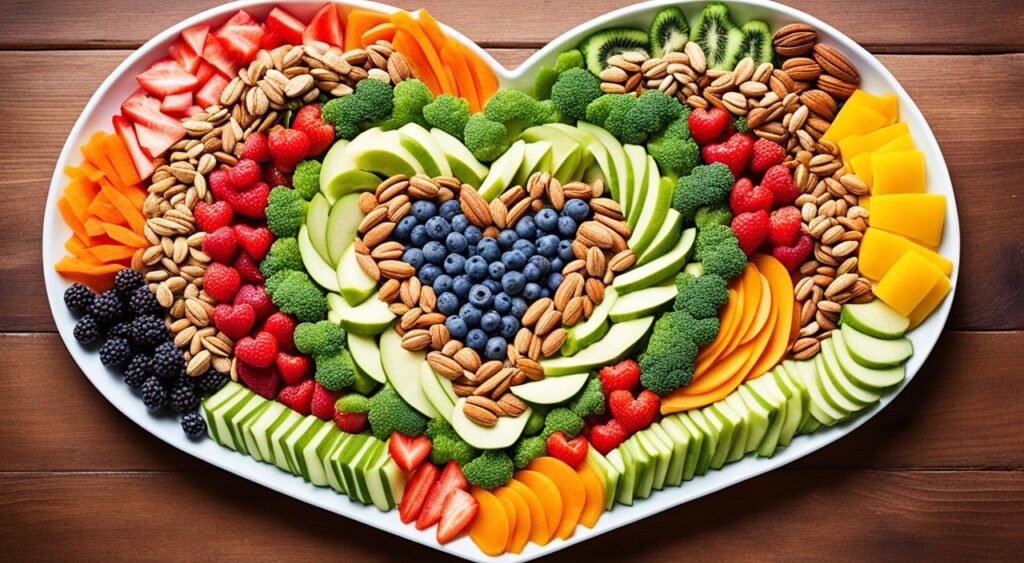Keeping your heart healthy is key to living well. The foods we eat make a big difference. Adding heart-friendly foods to our meals can help us control cholesterol, blood pressure, and reduce heart disease risks.
The top 10 foods that are great for your heart include leafy greens, whole grains, berries, avocados, and more. These foods are full of omega-3s, antioxidants, and fiber. They help keep your heart safe and work well.
Key Takeaways
- Heart-healthy foods can lower cholesterol, regulate blood pressure, and reduce the risk of heart disease.
- The 10 foods featured in this article are rich in beneficial compounds like omega-3s, antioxidants, fiber, and monounsaturated fats.
- Incorporating these nutrient-dense foods into your diet can support overall cardiovascular function and well-being.
- These foods include leafy greens, whole grains, berries, avocados, fatty fish, walnuts, beans, dark chocolate, tomatoes, and almonds.
- Adopting a heart-healthy diet can have a significant positive impact on your long-term cardiovascular health.
Leafy Green Vegetables: A Powerhouse for Heart Health
Leafy green vegetables like spinach, kale, and collard greens are full of good stuff for your heart. They have important vitamins, minerals, and antioxidants. These help keep your heart healthy and lower the chance of getting heart disease.
Packed with Vitamins, Minerals, and Antioxidants
Leafy greens are a great source of vitamin K. It helps blood clot properly and stops hardening of the arteries. They also have a lot of folate, magnesium, and carotenoids. These act as strong antioxidants. They protect the heart and blood vessels from damage caused by stress and inflammation.
Promote Proper Blood Clotting and Reduce Blood Pressure
Nitrates in leafy greens are key for heart health. They widen blood vessels, increase blood flow, and lower blood pressure. This eases the workload on your heart. Eating more leafy greens is linked to a lower chance of heart disease and other heart problems when compared with other veggies.
| Nutrient | Benefit for Heart Health |
|---|---|
| Vitamin K | Promotes proper blood clotting and prevents arterial calcification |
| Folate | Helps reduce homocysteine levels, a risk factor for heart disease |
| Magnesium | Supports healthy blood pressure and heart rhythm |
| Nitrates | Dilate blood vessels, improve blood flow, and lower blood pressure |
Eating a variety of leafy green vegetables can greatly help your heart. Spinach, kale, collard greens, and swiss chard are all good choices. They provide lots of benefits for your heart and overall health.
“Eating more leafy green vegetables is one of the best things you can do for your heart health.”
Whole Grains: Protecting Your Heart from the Inside Out
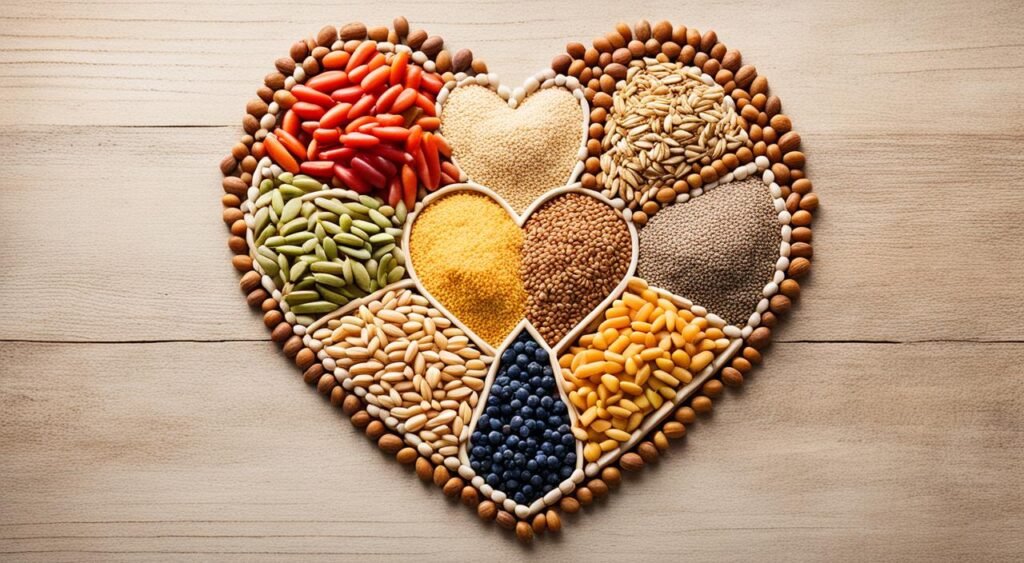
Maintaining a healthy heart is key, and whole grains play a big part. Unlike refined grains, whole grains are rich in heart-healthy nutrients. These can protect your heart from the inside.
Whole grains like whole wheat, brown rice, and oats have three parts. These are the germ, endosperm, and bran. They’re full of fiber which helps control cholesterol and keeps blood pressure healthy.
Whole grains do wonders for your heart, studies show. They lower cholesterol, reduce blood pressure, and cut the risk of diseases. This includes cardiovascular disease, stroke, and metabolic syndrome.
The American Heart Association advises adding whole grains to your diet. This can help fight hypertension and heart issues. Swapping to whole grains can be a great move for your heart.
| Whole Grain | Nutrients | Heart Health Benefits |
|---|---|---|
| Whole Wheat | Fiber, B vitamins, magnesium, selenium | Reduces cholesterol, lowers blood pressure, decreases heart disease risk |
| Brown Rice | Fiber, magnesium, selenium, antioxidants | Improves blood sugar control, reduces inflammation, supports healthy blood pressure |
| Oats | Fiber, beta-glucan, antioxidants | Lowers cholesterol, supports healthy blood pressure, reduces heart disease risk |
Eating a mix of whole grains has loads of benefits for your heart. It shields your heart’s health from within.
“Eating more whole grains can significantly improve your heart health. It lowers cholesterol, reduces blood pressure, and lessens cardiovascular disease risk.”
Berries: Tiny but Mighty for Your Cardiovascular System
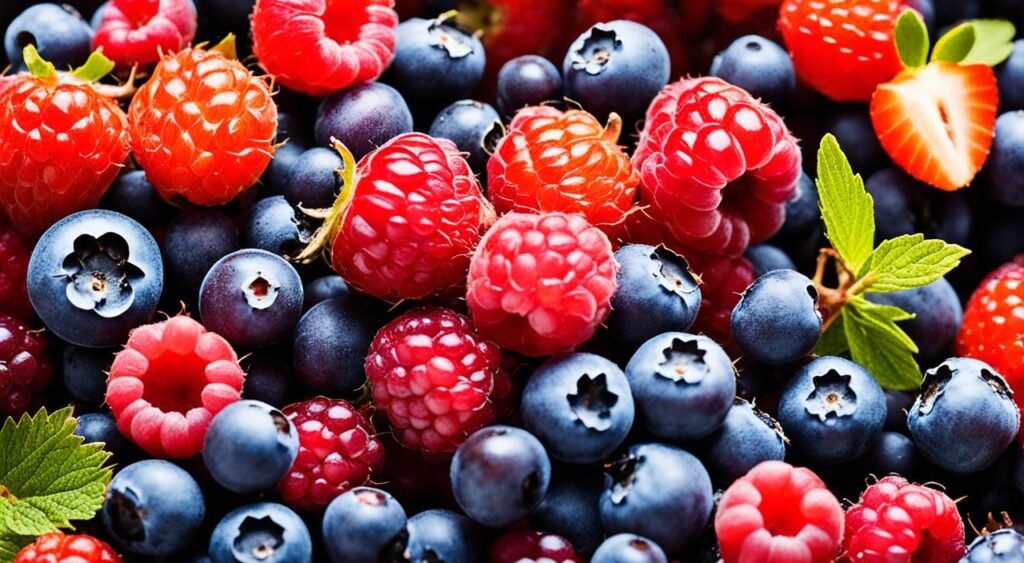
Berries, such as strawberries, blueberries, blackberries, and raspberries, are full of vital nutrients and antioxidants. They help with heart health. These fruits contain anthocyanins, which are strong antioxidants. They fight oxidative stress and inflammation, lowering heart disease risk.
Eating berries links to less coronary artery disease risk, including heart attack and high blood pressure. Adding blueberries to your daily intake can enhance blood vessel cell function. This, in turn, aids in controlling blood pressure and clotting. Including berries in your diet is both tasty and good for your heart.
Rich in Antioxidants and Anti-Inflammatory Compounds
Berries are a treasure trove of vitamins, minerals, and antioxidants for heart protection. They are high in anthocyanins, a flavonoid type that creates their bright colors. These top-notch antioxidants battle damaging free radicals and lower body inflammation.
Improve Vascular Function and Reduce Oxidative Stress
Eating berries regularly improves vascular function, ensuring blood vessels move as they should. Good vascular function stabilizes blood pressure and cuts cardiovascular event risks. Also, berries’ antioxidants fight oxidative stress, a main heart disease cause.
Whether fresh, frozen, or in recipes, berries are a tasty heart-healthy choice. Adding various berries to your meals brings a lot of heart benefits.
Avocados: A Heart-Healthy Superfood
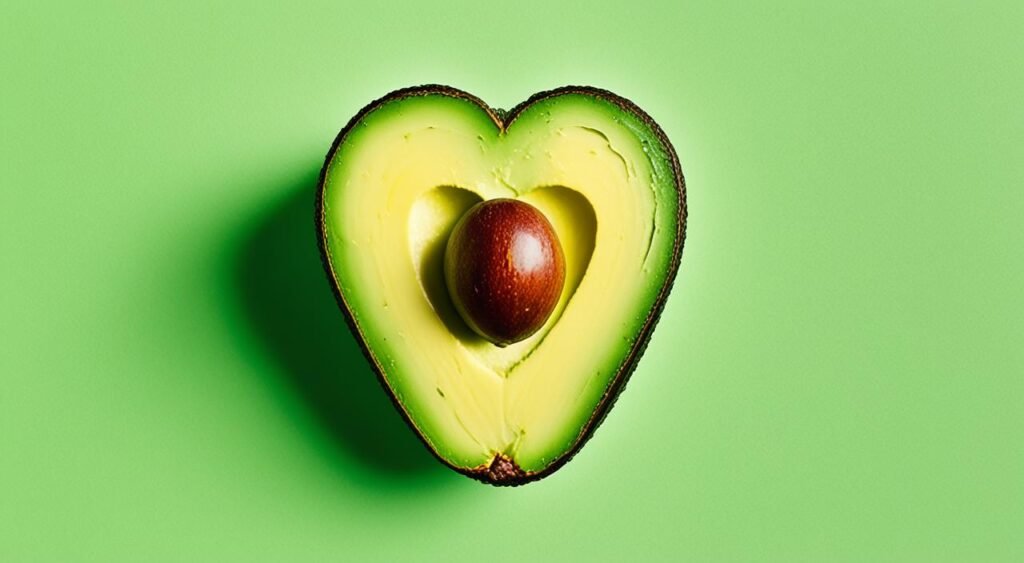
Avocados are full of heart-healthy benefits. They’re packed with good fats. These fats help lower cholesterol and reduce heart disease risk.
Monounsaturated Fats for Cholesterol Management
Eating avocados can cut heart disease risk. Including two servings a week reduces this risk. Avocados’ fats boost good cholesterol and lower bad cholesterol.
Potassium-Rich for Blood Pressure Regulation
Avocados are also rich in potassium. Potassium is key in keeping blood pressure in check. A serving of avocado has about 21% of your daily potassium needs.
| Nutrient | Amount per Serving (150g) | Percentage of Daily Value |
|---|---|---|
| Monounsaturated Fats | 15g | 23% |
| Potassium | 728mg | 21% |
| Cholesterol | 0mg | 0% |
| Triglycerides | 6g | 4% |
“Incorporating avocados into your diet can be a delicious and effective way to support your heart health.”
Fatty Fish and Fish Oil: Omega-3 Powerhouses
Fatty fish is a great addition to your diet for heart health. Fish like salmon, mackerel, and tuna are full of omega-3 fatty acids. These are healthy fats that boost your heart’s health.
Reduce Triglycerides, Blood Pressure, and Inflammation
Eating fatty fish and omega-3 fatty acids is good for your heart. They can lower your triglyceride levels. This helps prevent heart disease.
They also help with blood pressure and inflammation. These are big factors in heart problems. So, these fats do a lot of good for your heart.
Lower Risk of Cardiovascular Events and Arrhythmias
Adding fatty fish and omega-3 fatty acids to your meals lowers heart risks. This includes heart attacks and strokes. They also cut the odds of heart arrhythmias, which are dangerous irregular heartbeats.
If eating fatty fish isn’t your thing, consider fish oil supplements. They’re a good way to get your omega-3s. Together with fatty fish, omega-3s help keep your heart strong.
Walnuts: A Nutty Way to Heart Health
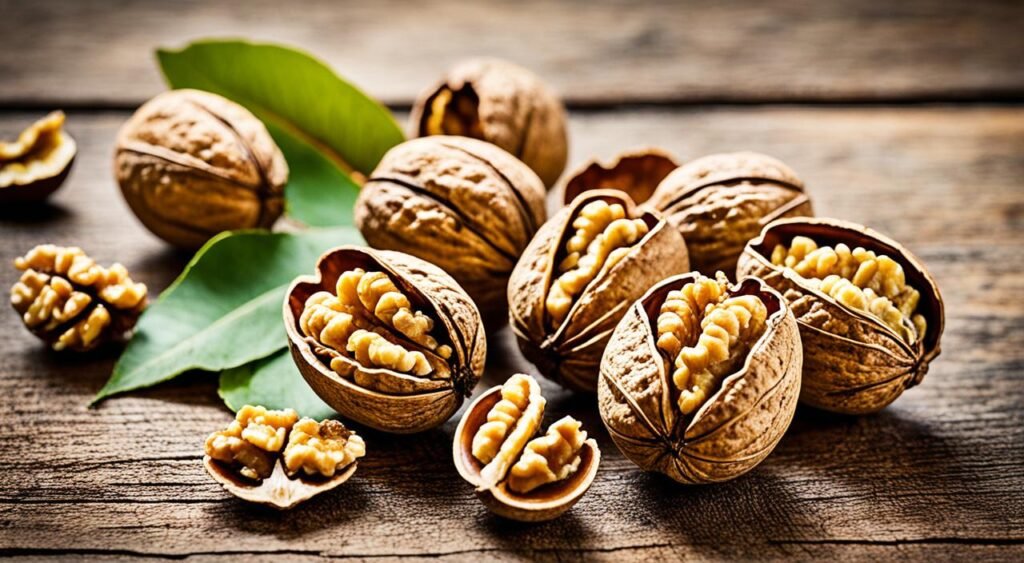
Walnuts are truly outstanding for your heart’s health. They are rich in nutrients that keep your heart strong. Eating them can lower your chance of getting heart disease.
They are full of fiber, magnesium, copper, and manganese. Their top benefit is their omega-3 fatty acids. These include alpha-linolenic acid (ALA). A diet with walnuts can bring down your bad cholesterol and overall cholesterol levels. This helps protect your heart.
Walnuts also lower the odds of heart disease. Their healthy fats, fiber, and nutrients are great for your heart. Adding them to your diet is smart for heart health.
“Incorporating walnuts into your daily routine can be a simple yet effective way to support your heart health and overall wellness.”
There are many tasty ways to eat walnuts. You can munch on them as a snack, bake with them, or top your salads with them. Doing this is a fun and healthful way to help your heart.
- Snack on a handful of walnuts as a healthy alternative to processed snacks.
- Use chopped walnuts to add crunch and flavor to oatmeal, yogurt, or salads.
- Bake with walnuts in breads, muffins, or other treats.
- Add walnuts to your favorite trail mix or granola recipe.
By eating walnuts regularly, you’re taking a tasty step towards better heart health. It’s a smart move for keeping heart disease at bay.
Heart health: Beans and Legumes for a Healthy Heart
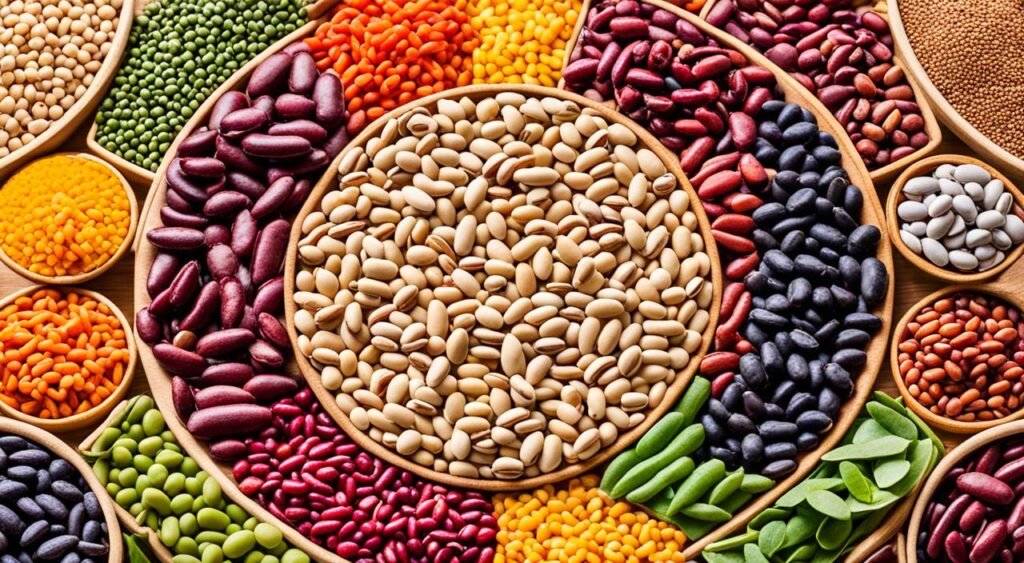
Beans and legumes offer many heart health benefits. They are rich in important nutrients like fiber, protein, vitamins, and minerals. Adding them to your diet is a smart move for a healthy heart.
Resistant Starch for Gut Health and Cholesterol Regulation
Beans and legumes contain a lot of resistant starch. This special starch is not fully digested but helps your good gut bacteria. It keeps your gut healthy. Plus, research shows it may lower bad cholesterol levels.
Lower Blood Pressure and Improve Glycemic Control
These foods also help with blood pressure and blood sugar. They are a good source of fiber, magnesium, and potassium, all of which are heart-friendly. For those with diabetes, their mix of carbohydrates and protein can stabilize blood sugar.
Adding beans and legumes to your meals is an easy way to boost your heart health. You can include them in many dishes, like soups, salads, or as a side. They’re a tasty, healthy choice to guard against heart issues.
| Nutrient | Benefits for Heart Health |
|---|---|
| Resistant Starch | Promotes gut health and regulates cholesterol levels |
| Fiber | Helps lower blood pressure and improve glycemic control |
| Magnesium and Potassium | Support healthy blood pressure |
Variety is key when it comes to beans and legumes. They can add flavor and nutrition to your meals. This supports your heart and well-being in a delicious way.
Dark Chocolate: An Indulgent Way to Support Your Heart
It might surprise you, but dark chocolate is good for your heart. It’s packed with a special type of antioxidant called flavonoids. These substances are great for keeping your arteries healthy and supporting your heart overall.
Flavonoids: Antioxidants for Artery Protection
Dark chocolate naturally contains flavonoids. These are plant-based compounds with strong antioxidant abilities. They battle harmful free radicals, which can cause harm leading to heart disease, coronary heart disease, stroke, and diabetes. They do this by keeping your arteries safe and improving how they work.
Moderate Consumption for Maximum Benefits
It’s true that moderation is crucial for dark chocolate and your heart. Eating up to six servings of 70% cocoa dark chocolate per week helps. It lowers the chances of heart disease and other heart issues. However, watch out for the extra sugar and calories. Too much can cancel out the good it does.
Adding small amounts of dark chocolate to a heart-healthy diet is a great idea. Enjoy it as a treat, making sure it’s high-quality. And remember, moderation is key for reaping its heart-protecting benefits.
“The flavonoids in dark chocolate can help neutralize harmful free radicals, preventing the oxidative damage and inflammation that can contribute to heart disease.”
Also Read: 10 Foods You Can Eat To Get Your Daily Dose Of Calcium
Conclusion: Embrace a Heart-Healthy Diet
Eating healthy is key to keeping your heart in good shape and lowering the risk of heart disease. Add foods like leafy greens, whole grains, and fatty fish to your meals. They are full of nutrients that help your heart, like omega-3s and fiber.
Choosing a diet focused on plants can support your heart health for the long run. Include avocados and berries to enjoy meals that are both tasty and good for your heart. Making these choices is a smart move to prevent heart problems.
Even small changes in your diet can greatly help your heart. Try to eat these healthy foods every day. Your heart will thank you for taking such good care of it.
FAQs
What are 10 foods that can boost your heart health?
Ten foods that boost your heart health are easy to find. They include leafy green vegetables, whole grains, and berries. You can also enjoy avocados, fatty fish, walnuts, and beans. Dark chocolate, tomatoes, and almonds are good for your heart too.
How do leafy green vegetables support heart health?
Leafy greens like spinach and kale offer essential vitamins and minerals. They’re great for your heart because they help protect the arteries and promote blood clotting. They also reduce blood pressure and improve the health of cells in your blood vessels.
What are the benefits of whole grains for heart health?
Whole grains, found in whole wheat and oats, are heart protective. They lower cholesterol and blood pressure, reducing the risk of heart disease. Eating whole grains lowers your chances of getting heart and metabolic diseases.
How can berries benefit cardiovascular health?
Berries are powerful for your heart because they’re full of nutrients and antioxidants. These include anthocyanins, which fight heart disease. Eating berries is linked to a lower risk of heart attack and high blood pressure.
What makes avocados a heart-healthy food?
Avocados contain healthy fats that lower cholesterol and risk of heart disease. They’re also high in potassium, good for managing blood pressure. Two avocados a week can reduce your risk of heart problems.
Why are fatty fish and fish oil beneficial for the heart?
Fatty fish like salmon are rich in omega-3s, benefiting the heart. Omega-3s help prevent heart disease and reduce the risk of heart events. Eating fish is also linked to lower risks of depression and heart disease.
How do walnuts contribute to heart health?
Walnuts are full of important nutrients like fiber and magnesium. They can lower bad cholesterol levels. Eating walnuts regularly reduces the risk of heart disease.
What are the heart-healthy benefits of beans and legumes?
Beans and legumes are full of resistant starch, which is good for your gut and heart. They can lower cholesterol and control blood sugar. They also reduce the risk of heart disease, especially for those with diabetes.
How can dark chocolate support heart health?
Dark chocolate has antioxidants that improve heart function. Eating it in moderation is linked to a lower risk of heart and blood sugar problems. Its antioxidants protect against heart disease by fighting off free radicals.
